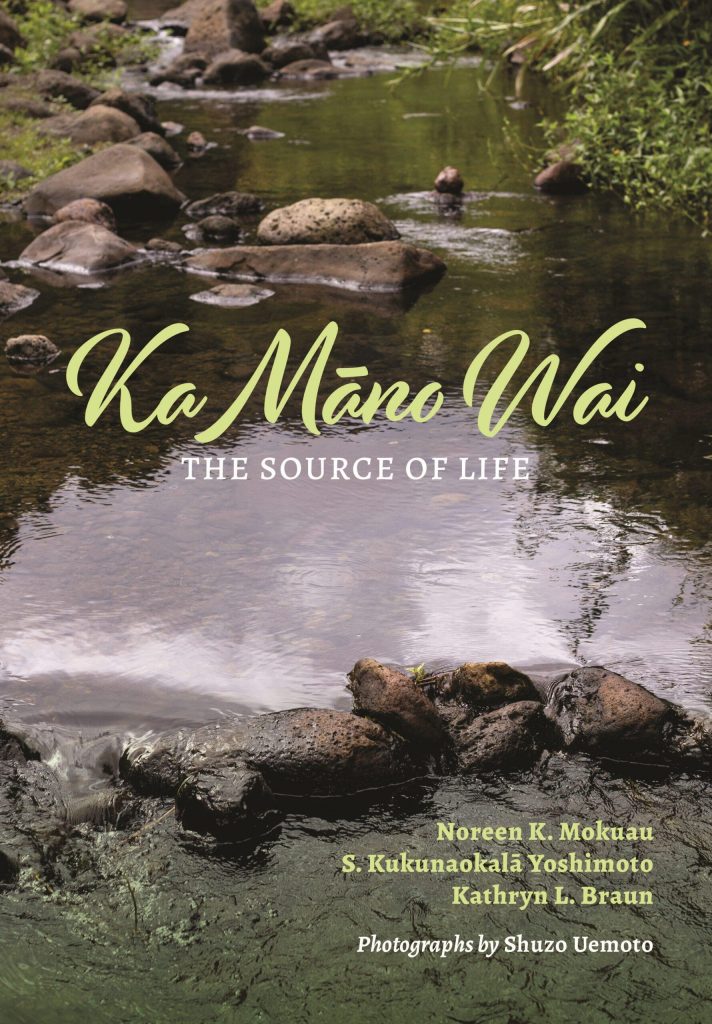UH professors publish book on Hawaiian cultural practices for health, social justice

A new book by three professors at the University of Hawaiʻi at Mānoa’s Thompson School of Social Work and Public Health explores Native Hawaiian cultural practices from the perspectives of 14 esteemed kumu loea, or experts.
“Ka Māno Wai: The Source of Life” by Noreen Mokuau, Kukunaokalā Yoshimoto and Kathryn Braun shows why Native Hawaiian practices such as mālama ʻāina (caring for the land), mele (songs) and hoʻoponopono (conflict resolution) are essential to health and social justice.
The book explores the history of the practices as well as their significance within Hawaiian society, including how they are linked to Native Hawaiian health, family life and spiritual beliefs.

“Many of these practices were forced underground after the colonization of Hawaiʻi,” Braun said. “There was a large potential for cultural loss, and we wrote the book to re-illuminate the practices and some of the kumu who teach them.”
Using captivating storytelling, the book unfolds through 16 chapters, with 14 of them dedicated to the moʻolelo (stories) of kumu loea as knowledge keepers of Native Hawaiian practices.
The book features renowned authorities in specialty areas of cultural practice that draw from ancestral ʻike (knowledge), including: Kamanaʻopono M. Crabbe, Linda Kaleoʻokalani Paik, Eric Michael Enos, Claire Kuʻuleilani Hughes, Sarah Patricia ʻIlialoha Ayat Keahi, Jonathan Kay Kamakawiwoʻole Osorio, Lynette Kaʻopuiki Paglinawan, Sharon Leinaʻala Bright, Keola Kawaiʻulaʻiliahi Chan, Charles “Sonny” Kaulukukui III, Jerry Walker, Gordon “ʻUmi” Kai, Melody Kapilialoha MacKenzie and Kekuni Blaisdell.
Photographs by Shuzo Uemoto capture these kumu loea in their practices.
“We believe that Ka Māno Wai is a resource that supports the university and the Thompson School’s strategic imperative in fulfilling its kuleana to Native Hawaiians and Hawaiʻi,” Mokuau said. “In this book, kumu loea share their life’s work on ancestral practices that hold deep value for improving health and advancing social justice for Native Hawaiians and others.”
Yoshimoto said: “We are humbled and honored to have had the opportunity to be in the presence of such esteemed and beloved culture keepers and to share their journey. We hope that their stories will inspire all generations to holomua (to progress, advance), to continue cultivating their gift and to share their story. You’ll never know who will be inspired.”
One chapter explains the history of the practice of kaula, or rope making, and tells the story of Sonny Kaulukukui III, who grew up in Kalihi and learned kaula from his uncle. Strong ropes that were meticulously hand-braided from plant fibers, such as olonā and hau, were essential to Native Hawaiians for fishing and constructing homes. The chapter weaves together the story of Kaulukukui’s family and the history of the practice.
Another chapter focuses on lāʻau lapaʻau, which is the use of Hawaiian medicinal plants and prayers in healing. At the Waimānalo Health Center, Sharon Leinaʻala Bright has worked to integrate the practice into conventional Western health care by working alongside doctors.
Other chapters highlight the practices of ʻōlelo (Hawaiian language), lomilomi (massage) and ʻaiaola (using traditional Native Hawaiian foods to improve health).
The book is now being used as the course textbook for Ke Aʻo Mau, a program for University of Hawaiʻi undergraduate and graduate students who are committed to culturally responsive interventions for Native Hawaiians and other populations.
“Ka Māno Wai: The Source of Life” is published by University of Hawaiʻi Press and available for purchase on their website and on Amazon.












